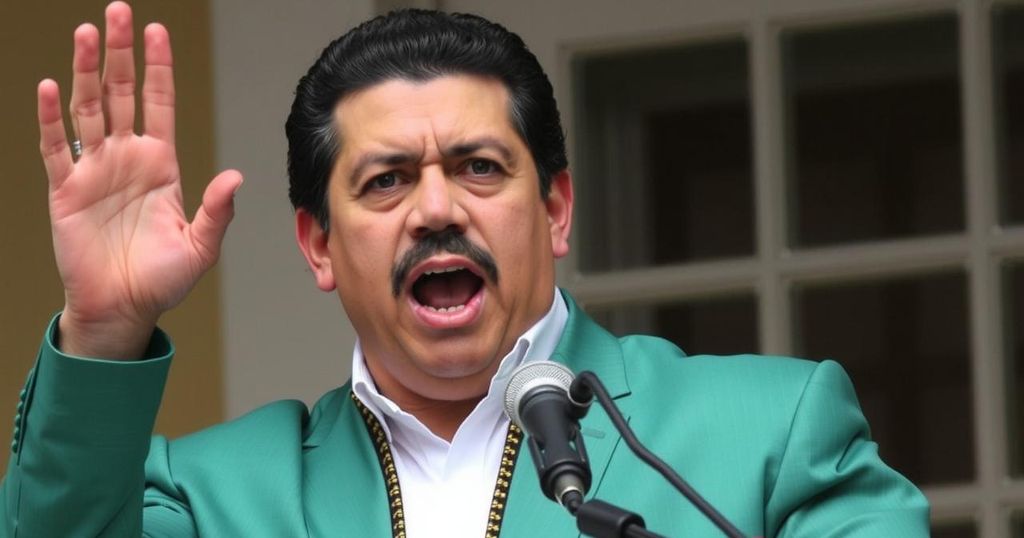Nicolás Maduro Sworn in for Third Term Amid Global Outcry Over Election Fraud

Nicolás Maduro was sworn in for a third term as president of Venezuela, despite widespread criticism over alleged election fraud. Most democratic leaders boycotted the ceremony, while Maduro claimed victory and framed his leadership as part of a democratic revolution. International condemnation grew following claims of a dictatorship, particularly from leftist leaders and figures, including the U.S. and UK officials. Opposition leaders vowed to resist Maduro’s rule, citing non-violent methods to reclaim sovereignty for the Venezuelan people.
Nicolás Maduro has officially commenced his third term as Venezuela’s president in a ceremony marked by significant domestic dissent and widespread international disapproval, particularly regarding allegations of election fraud from the previous year. During a sparsely attended event in Caracas, Maduro proclaimed it a momentous achievement for Venezuelan democracy, despite most democratic leaders opting to boycott the occasion in protest of his controversial presidency. Maduro’s administration, characterized by increasing repression since 2013, has faced accusations from opposition parties who assert that their candidate, Edmundo González, won the election amid national discontent fueled by economic decline.
Boycotting the ceremony were prominent leftist leaders such as Brazil’s Lula and Colombia’s Petro, showcasing a growing regional rejection of Maduro’s legitimacy. Conversely, Maduro received support from authoritarian regimes like Cuba and Nicaragua, as well as envoys from China and Russia, illustrating a divide in international response. In a lengthy address, Maduro framed himself as a champion of democracy and a defender against imperialism, disparaging his political adversaries and invoking historical figures of Latin American independence. This rhetoric was met with criticism from both domestic and international figures, including Chile’s Gabriel Boric, who characterized Maduro’s government as dictatorial.
The U.S. government reiterated its non-recognition of Maduro’s presidency, with Secretary of State Antony Blinken emphasizing the need for a return to democratic governance in Venezuela. Additionally, the United Kingdom’s Foreign Secretary David Lammy described Maduro’s power as fraudulent, declaring that the outcomes of the elections were neither free nor legitimate. Similar sentiments were echoed by Brazil’s President Lula, who noted the deteriorating relationship with Venezuela under Maduro’s regime. As Maduro’s administration continues amidst turmoil, opposition voices remain adamant in their quest for the restoration of democratic norms, vowing to resist through peaceful measures despite the ongoing repression against dissent.
The political landscape in Venezuela has been tumultuous, particularly since Nicolás Maduro assumed power following the election of 2013. His presidency has increasingly diverged from democratic principles, leading to allegations of systemic corruption, electoral fraud, and human rights violations. The July 2024 elections, which Maduro claims to have won, were marked by strong opposition and evidence suggesting widespread electoral misconduct. The increasing isolation of Maduro’s regime is mirrored by both domestic dissent and growing international condemnation. This culminates in a significant reevaluation of Venezuela’s political alliances, particularly among leftist governments in Latin America. Furthermore, the economic crisis in Venezuela, characterized by hyperinflation and widespread poverty, has fueled public outcry against Maduro’s governance, prompting many Venezuelans to seek alternative leadership. As the political crisis persists, the contrast between Maduro’s assertions of a democratic mandate and the realities faced by the population highlights the complexities of Venezuela’s ongoing struggle for democracy. Maduro’s recent swearing-in and the reactions it garnered reflect the deepening divisions not only within Venezuela but also in the international community regarding the recognition of his regime.
Nicolás Maduro’s inauguration marks the onset of his third term amidst a backdrop of national discontent and international disapproval regarding electoral integrity. His refusal to concede allegations of electoral fraud reveals a broader crisis in Venezuelan democracy, met with scorn from both regional allies and opposition leaders. The call for accountability continues as prominent figures assert the need for non-violent resistance against Maduro’s regime, as they strive for a restoration of genuine democratic governance in Venezuela despite the considerable challenges ahead.
Original Source: www.theguardian.com







